《兰亭集序》林语堂版英译文
兰亭序原文及翻译

兰亭序原文及翻译兰亭序原文及翻译兰亭序,又名《兰亭集序》、《兰亭宴集序》、《临河序》、《禊序》、《禊帖》。
晋代书法家,会稽内史王羲之撰写。
下面,小编为大家分享兰亭序原文及翻译,希望对大家有所帮助!原文:永和九年,岁在癸丑,暮春之初,会于会稽山阴之兰亭,修禊事也。
群贤毕至,少长咸集。
此地有崇山峻岭,茂林修竹;又有清流激湍,映带左右,引以为流觞曲水,列坐其次。
虽无丝竹管弦之盛,一觞一咏,亦足以畅叙幽情。
是日也,天朗气清,惠风和畅,仰观宇宙之大,俯察品类之盛,所以游目骋怀,足以极视听之娱,信可乐也。
夫人之相与,俯仰一世,或取诸怀抱,悟言一室之内;或因寄所托,放浪形骸之外。
虽趣舍万殊,静躁不同,当其欣于所遇,暂得于己,快然自足,不知老之将至。
及其所之既倦,情随事迁,感慨系之矣。
向之所欣,俯仰之间,已为陈迹,犹不能不以之兴怀。
况修短随化,终期于尽。
古人云:“死生亦大矣。
”岂不痛哉!(不知老之将至一作:曾不知老之将至)每览昔人兴感之由,若合一契,未尝不临文嗟悼,不能喻之于怀。
固知一死生为虚诞,齐彭殇为妄作。
后之视今,亦犹今之视昔。
悲夫!故列叙时人,录其所述,虽世殊事异,所以兴怀,其致一也。
后之览者,亦将有感于斯文。
注释:永和:东晋皇帝司马聃(晋穆帝)的年号,从公元345—356年共12年。
永和九年上巳节,王羲之与谢安,孙绰等41人。
举行禊礼,饮酒赋诗,事后将作品结为一集,由王羲之写了这篇序总述其事。
暮春:阴历三月。
暮,晚。
会:集会。
会稽(kuài jī):郡名,今浙江绍兴。
山阴:今绍兴越城区。
修禊(xì)事也:(为了做)禊礼这件事。
古代习俗,于阴历三月上旬的巳日(魏以后定为三月三日),人们群聚于水滨嬉戏洗濯,以祓除不祥和求福。
实际上这是古人的一种游春活动。
群贤:诸多贤士能人。
指谢安等三十二位社会的名流。
贤:形容词做名词。
毕至:全到。
毕,全、都。
少长:如王羲之的儿子王凝之、王徽之是少;谢安、王羲之等是长。
兰亭集序-林语堂翻译
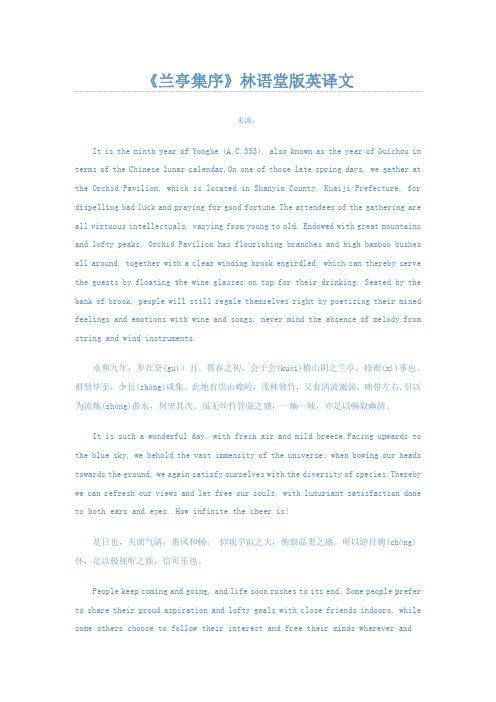
《兰亭集序》林语堂版英译文来源:It is the ninth year of Yonghe (A.C.353), also known as the year of Guichou in terms of the Chinese lunar calendar.On one of those late spring days, we gather at the Orchid Pavilion, which is located in Shanyin County, Kuaiji Prefecture, for dispelling bad luck and praying for good fortune.The attendees of the gathering are all virtuous intellectuals, varying from young to old. Endowed with great mountains and lofty peaks, Orchid Pavilion has flourishing branches and high bamboo bushes all around, together with a clear winding brook engirdled, which can thereby serve the guests by floating the wine glasses on top for their drinking. Seated by the bank of brook, people will still regale themselves right by poetizing their mixed feelings and emotions with wine and songs, never mind the absence of melody from string and wind instruments.永和九年,岁在癸(guǐ)丑。
兰亭集序(中英)
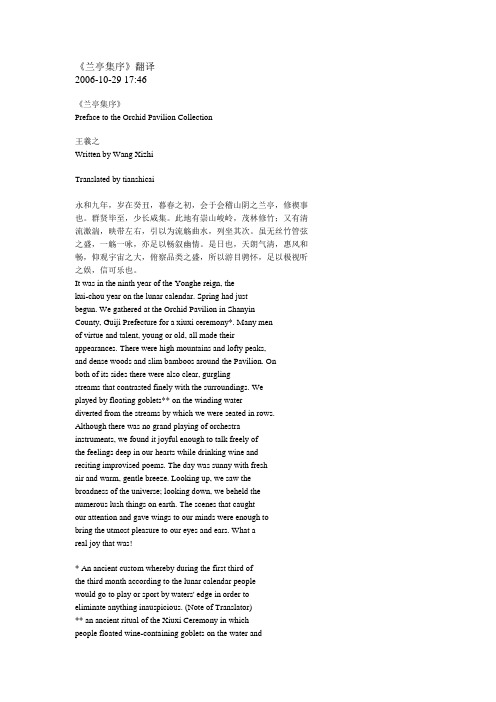
《兰亭集序》翻译2006-10-29 17:46《兰亭集序》Preface to the Orchid Pavilion Collection王羲之Written by Wang XizhiTranslated by tianshicai永和九年,岁在癸丑,暮春之初,会于会稽山阴之兰亭,修禊事也。
群贤毕至,少长咸集。
此地有崇山峻岭,茂林修竹;又有清流激湍,映带左右,引以为流觞曲水,列坐其次。
虽无丝竹管弦之盛,一觞一咏,亦足以畅叙幽情。
是日也,天朗气清,惠风和畅,仰观宇宙之大,俯察品类之盛,所以游目骋怀,足以极视听之娱,信可乐也。
It was in the ninth year of the Yonghe reign, thekui-chou year on the lunar calendar. Spring had justbegun. We gathered at the Orchid Pavilion in ShanyinCounty, Guiji Prefecture for a xiuxi ceremony*. Many menof virtue and talent, young or old, all made theirappearances. There were high mountains and lofty peaks,and dense woods and slim bamboos around the Pavilion. Onboth of its sides there were also clear, gurglingstreams that contrasted finely with the surroundings. Weplayed by floating goblets** on the winding waterdiverted from the streams by which we were seated in rows. Although there was no grand playing of orchestrainstruments, we found it joyful enough to talk freely ofthe feelings deep in our hearts while drinking wine andreciting improvised poems. The day was sunny with freshair and warm, gentle breeze. Looking up, we saw thebroadness of the universe; looking down, we beheld thenumerous lush things on earth. The scenes that caughtour attention and gave wings to our minds were enough tobring the utmost pleasure to our eyes and ears. What areal joy that was!* An ancient custom whereby during the first third ofthe third month according to the lunar calendar peoplewould go to play or sport by waters' edge in order toeliminate anything inauspicious. (Note of Translator)** an ancient ritual of the Xiuxi Ceremony in whichpeople floated wine-containing goblets on the water andpicked those held back at the turns for drinking.(Noteof Translator)夫人之相与,俯仰一世,或取诸怀抱,晤言一室之内;或因寄所托,放浪形骸之外。
《兰亭集序》翻译

《兰亭集序》翻译永和九年,岁在癸丑,暮春之初,会于会稽山阴之兰亭,修禊事也。
永和九年,时在癸丑之年,阴历三月初,我们会集在会稽郡山阴的兰亭,(为了)做禊事。
群贤毕至,少长咸集。
众多贤才都会聚在这里,年龄大的小的都聚集在一起。
此地有崇山峻岭,茂林修竹,又有清流激湍,映带左右,引以为流觞曲水,列坐其次。
兰亭这地方有崇山峻岭环抱,林木繁茂竹篁幽密。
又有清澈湍急的溪流,辉映围绕在亭子的四周,引(清流激湍)来作为流觞的曲水,列坐在曲水之旁。
虽无丝竹管弦之盛,一觞一咏,亦足以畅叙幽情。
即使没有演奏音乐的盛况,只是饮酒赋诗,也足以令人畅叙幽深内藏的感情。
是日也,天朗气清,惠风和畅。
这一天,晴明爽朗,和风习习。
仰观宇宙之大,俯察品类之盛,所以游目骋怀,足以极视听之娱,信可乐也。
仰首可以观览浩大的宇宙,俯身可以考察地上万物的繁多,借以纵展眼力、开畅胸怀,足以极尽视听的乐趣,实在是人生的一大乐事。
夫人之相与,俯仰一世。
人与人相交往,很快便度过了一生。
或取诸怀抱,悟言一室之内;或因寄所托,放浪形骸之外。
有的人把自己的胸怀抱负在室内畅谈;有的人就着自己爱好的事物寄托自己的情怀,不受约束、自由放纵地生活。
虽趣舍万殊,静躁不同,当其欣于所遇,暂得于己,快然自足,不知老之将至;虽然他们各有各的爱好,安静躁动(的性格)各不相同,但当他们对所接触的事物感到高兴,一时感到自得,感到高兴和满足时,竟然不知道老年将要来到。
及其所之既倦,情随事迁,感慨系之矣。
等到对已获取的东西发生厌倦,情事变迁,又不免会引发无限的感慨。
向之所欣,俯仰之间,已为陈迹,犹不能不以之兴怀,况修短随化,终期于尽!以往所得到的欢欣,很快就成为历史的陈迹,人们对此尚且不能不为之感念伤怀,更何况人的一生长短取决于造化,而终究要归结于穷尽呢!古人云,“死生亦大矣”,岂不痛哉!古人说:“死生是一件大事。
”这怎么能不让人痛心啊!每览昔人兴感之由,若合一契,未尝不临文嗟悼,不能喻之于怀。
《兰亭集序》林语堂英译文

《兰亭集序》林语堂英译文It is the ninth year of Yonghe (A.C.353), also known as the year of Guichou in terms of the Chinese lunar calendar.On one of those late spring days, we gather at the Orchid Pavilion, which is located in Shanyin County, Kuaiji Prefecture, for dispelling bad luck and praying for good fortune.The attendees of the gathering are all virtuous intellectuals, varying from young to old. Endowed with great mountains and lofty peaks, Orchid Pavilion has flourishing branches and high bamboo bushes all around, together with a clear winding brook engirdled, which can thereby serve the guests by floating the wine glasses on top for their drinking. Seated by the bank of brook, people will still regale themselves right by poetizing their mixed feelings and emotions with wine and songs, never mind the absence of melody from string and wind instruments.It is such a wonderful day, with fresh air and mild breeze.Facing upwards to the blue sky, we behold the vast immensity of the universe; when bowing our heads towards the ground, we again satisfy ourselves with the diversity of species.Thereby we can refresh our views and let free our souls,with luxuriant satisfaction done to both ears and eyes. How infinite the cheer is!永和九年,岁正在癸(guǐ)丑。
《兰亭集序》英语译文
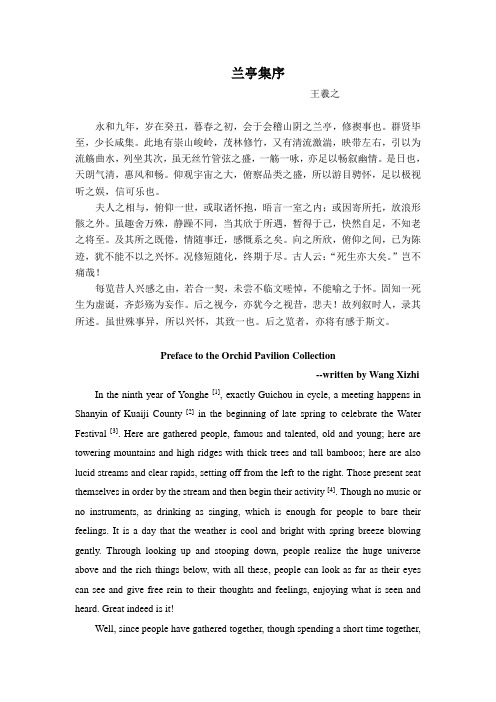
兰亭集序王羲之永和九年,岁在癸丑,暮春之初,会于会稽山阴之兰亭,修禊事也。
群贤毕至,少长咸集。
此地有崇山峻岭,茂林修竹,又有清流激湍,映带左右,引以为流觞曲水,列坐其次,虽无丝竹管弦之盛,一觞一咏,亦足以畅叙幽情。
是日也,天朗气清,惠风和畅。
仰观宇宙之大,俯察品类之盛,所以游目骋怀,足以极视听之娱,信可乐也。
夫人之相与,俯仰一世,或取诸怀抱,晤言一室之内;或因寄所托,放浪形骸之外。
虽趣舍万殊,静躁不同,当其欣于所遇,暂得于己,快然自足,不知老之将至。
及其所之既倦,情随事迁,感慨系之矣。
向之所欣,俯仰之间,已为陈迹,犹不能不以之兴怀。
况修短随化,终期于尽。
古人云:“死生亦大矣。
”岂不痛哉!每览昔人兴感之由,若合一契,未尝不临文嗟悼,不能喻之于怀。
固知一死生为虚诞,齐彭殇为妄作。
后之视今,亦犹今之视昔,悲夫!故列叙时人,录其所述。
虽世殊事异,所以兴怀,其致一也。
后之览者,亦将有感于斯文。
Preface to the Orchid Pavilion Collection--written by Wang Xizhi In the ninth year of Yonghe [1], exactly Guichou in cycle, a meeting happens in Shanyin of Kuaiji County [2]in the beginning of late spring to celebrate the Water Festival [3]. Here are gathered people, famous and talented, old and young; here are towering mountains and high ridges with thick trees and tall bamboos; here are also lucid streams and clear rapids, setting off from the left to the right. Those present seat themselves in order by the stream and then begin their activity [4]. Though no music or no instruments, as drinking as singing, which is enough for people to bare their feelings. It is a day that the weather is cool and bright with spring breeze blowing gently. Through looking up and stooping down, people realize the huge universe above and the rich things below, with all these, people can look as far as their eyes can see and give free rein to their thoughts and feelings, enjoying what is seen and heard. Great indeed is it!Well, since people have gathered together, though spending a short time together,some speak their bosom freely, sitting face to face to talk, and some take advantage of other things like wine or mountains to express their emotions, being opened-minded and unruly beyond bodily realities. Although people make different choices according to their silent or restless temperaments, yet when they have met what they like, no matter the time might be short, they’ll feel happy and contented, so excited that forget they would become old. Until they are tired of their pursuits and with things changing, change also their feelings. Because of the prosperity, they would like to look forward of their pursuits, however, in the twinkling of an eye, what they like would have become old, no wonder why their feelings would be changing with the circumstances changing! Moreover, it is natural that their lives should be long or short, an end would become in the end. The ancients said: “Death is great, life too.” Isn’t it sad?When studying the joys or sadness of the ancients, if the reasons are the same like a piece of Qi [5], it is natural that people have some feelings when reading those writings; it is natural that people should understand the writings in their hearts. Well, it is fantastic to consider death and life as the same thing, and it is absurd to equate longevity with early death. Alas! The posterity will look upon the present people just like the present people look upon the ancients. Thus, it is necessary to record the people present and write down the poems. Although times and things may differ, moods and feelings what they have in their hearts will be the same. Furthermore, the future readers will also affect by these writings.[1] It is 353AD.[2] Today it is Shaoxing in Zhejiang.[3] A memorial ceremony happens on the third day of March every year by the riversor streams to wash away the evil spirits.[4] That is: a cup filled with wine is floating down the curving stream, when it comesto the front of someone, he can take it and drink it but he should sing a poem at once.[5] A kind of contract is divided into two parts, which is made of bamboo or wood, itis a proof if the two parts can coincide with each other.-------translated by Liu Yanhui。
课文《兰亭集序》原文及注释译文
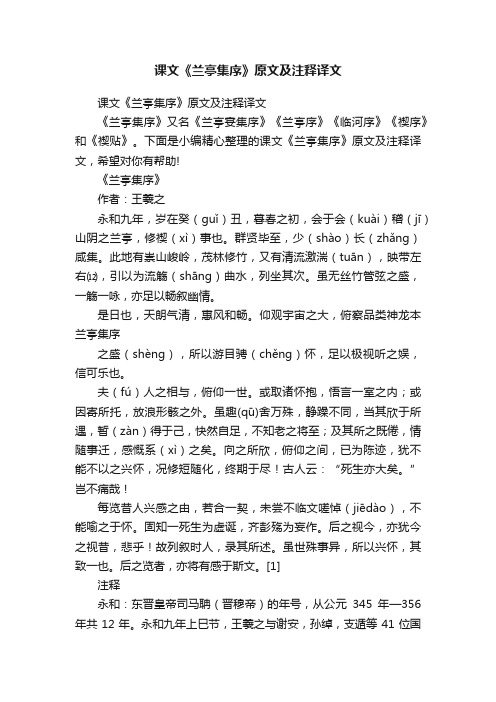
课文《兰亭集序》原文及注释译文课文《兰亭集序》原文及注释译文《兰亭集序》又名《兰亭宴集序》《兰亭序》《临河序》《禊序》和《禊贴》。
下面是小编精心整理的课文《兰亭集序》原文及注释译文,希望对你有帮助!《兰亭集序》作者:王羲之永和九年,岁在癸(guǐ)丑,暮春之初,会于会(kuài)稽(jī)山阴之兰亭,修禊(xì)事也。
群贤毕至,少(shào)长(zhǎng)咸集。
此地有崇山峻岭,茂林修竹,又有清流激湍(tuān),映带左右⑿,引以为流觞(shāng)曲水,列坐其次。
虽无丝竹管弦之盛,一觞一咏,亦足以畅叙幽情。
是日也,天朗气清,惠风和畅。
仰观宇宙之大,俯察品类神龙本兰亭集序之盛(shèng),所以游目骋(chěng)怀,足以极视听之娱,信可乐也。
夫(fú)人之相与,俯仰一世。
或取诸怀抱,悟言一室之内;或因寄所托,放浪形骸之外。
虽趣(qū)舍万殊,静躁不同,当其欣于所遇,暂(zàn)得于己,快然自足,不知老之将至;及其所之既倦,情随事迁,感慨系(xì)之矣。
向之所欣,俯仰之间,已为陈迹,犹不能不以之兴怀,况修短随化,终期于尽!古人云:“死生亦大矣。
”岂不痛哉!每览昔人兴感之由,若合一契,未尝不临文嗟悼(jiēdào),不能喻之于怀。
固知一死生为虚诞,齐彭殇为妄作。
后之视今,亦犹今之视昔,悲乎!故列叙时人,录其所述。
虽世殊事异,所以兴怀,其致一也。
后之览者,亦将有感于斯文。
[1]注释永和:东晋皇帝司马聃(晋穆帝)的年号,从公元345年—356年共12年。
永和九年上巳节,王羲之与谢安,孙绰,支遁等41位国家顶级军政明星在兰亭集会,举行禊礼,饮酒赋诗,事后将作品结为一集,由王羲之写了这篇序总述其事。
暮春:阴历三月。
暮,晚。
会[huì]于会[kuài]稽:会:集会。
会稽,郡名,今浙江绍兴。
山阴:今绍兴越城区。
《兰亭集序》原文及翻译

《兰亭集序》原文及翻译《兰亭集序》原文及翻译无论在学习、工作或是生活中,大家总少不了接触文言文吧,借助文言文人们可以反映客观事物、表达思想感情、传递知识信息。
以下是小编收集整理的《兰亭集序》原文及翻译,欢迎阅读与收藏。
《兰亭集序》原文及翻译 1兰亭集序原文:永和九年,岁在癸(guǐ)丑,暮春之初,会于会稽(kuài jī)山阴之兰亭,修禊(xì)事也。
群贤毕至,少长咸集。
此地有崇山峻岭,茂林修竹,又有清流激湍(tuān),映带左右。
引以为流觞(shāng)曲( qū)水,列坐其次,虽无丝竹管弦之盛,一觞(shang)一咏,亦足以畅叙幽情。
是日也,天朗气清,惠风和畅。
仰观宇宙之大,俯察品类之盛,所以游目骋(chěng)怀,足以极视听之娱,信可乐也。
夫人之相与,俯仰一世。
或取诸怀抱,晤言一室之内;或因寄所托,放浪形骸(hái)之外。
虽趣(qǔ)舍万殊,静躁不同,当其欣于所遇,暂得于己,怏然自足,不知老之将至。
及其所之既倦,情随事迁,感慨系(xì)之矣。
向之所欣,俯仰之间,已为陈迹,犹不能不以之兴怀。
况修短随化,终期于尽。
古人云:"死生亦大矣。
"岂不痛哉!每览昔人兴感之由,若合一契,未尝不临文嗟(jiē)悼,不能喻之于怀。
固知一死生为虚诞,齐彭殇(shāng)为妄作。
后之视今,亦犹今之视昔,悲夫!故列叙时人,录其所述。
虽世殊事异,所以兴怀,其致一也。
后之览者,亦将有感于斯文。
兰亭集序翻译:永和九年,即癸丑年,三月之初,(名士们)在会稽郡山北面的兰亭聚会,到水边进行消灾求福的活动。
许多有声望有才气的人都来了,有年轻的,也有年长的。
这里有高大的山和险峻的岭,有茂密的树林和高高的竹子,又有清水急流,(在亭的)左右辉映环绕。
把水引到(亭中)的环形水渠里来,让酒杯飘流水上(供人们取饮)。
人们在曲水旁边排列而坐,虽然没有管弦齐奏的盛况,(可是)一边饮酒一边赋诗,也足以痛快地表达各自埋藏在心中的情怀。
《兰亭集序》全文及翻译

《兰亭集序》全文及翻译《兰亭集序》全文及翻译《兰亭集序》又名《兰亭宴集序》《兰亭序》《临河序》《禊序》和《禊贴》。
东晋穆帝永和九年(公元353年)三月三日,王羲之与谢安、孙绰等四十一位军政高官,在山阴(今浙江绍兴)兰亭“修禊”,会上各人做诗,王羲之为他们的诗写的序文手稿。
以下是小编精心整理的《兰亭集序》全文及翻译,欢迎大家分享。
《兰亭集序》原文:永和九年,岁在癸丑,暮春之初,会于会稽山阴之兰亭,修禊事也。
群贤毕至,少长咸集。
此地有崇山峻岭,茂林修竹,又有清流激湍,映带左右,引以为流觞曲水,列坐其次。
虽无丝竹管弦之盛,一觞一咏,亦足以畅叙幽情。
是日也,天朗气清,惠风和畅。
仰观宇宙之大,俯察品类之盛,所以游目骋怀,足以极视听之娱,信可乐也。
夫人之相与,俯仰一世。
或取诸怀抱,悟言一室之内;或因寄所托,放浪形骸之外。
虽趣舍万殊,静躁不同,当其欣于所遇,暂得于己,快然自足,不知老之将至;及其所之既倦,情随事迁,感慨系之矣。
向之所欣,俯仰之间,已为陈迹,犹不能不以之兴怀,况修短随化,终期于尽!古人云:“死生亦大矣。
”岂不痛哉!每览昔人兴感之由,若合一契,未尝不临文嗟悼,不能喻之于怀。
固知一死生为虚诞,齐彭殇为妄作。
后之视今,亦犹今之视昔,悲夫!故列叙时人,录其所述,虽世殊事异,所以兴怀,其致一也。
后之览者,亦将有感于斯文。
《兰亭集序》注释:1、永和:东晋皇帝司马聃(晋穆帝)的年号,从公元345——356年共12年。
永和九年上巳节,王羲之与谢安,孙绰等41人。
举行禊礼,饮酒赋诗,事后将作品结为一集,由王羲之写了这篇序总述其事。
2、暮春:阴历三月。
暮,晚。
3、会:集会。
4、会稽(kuài jī):郡名,今浙江绍兴。
5、山阴:今绍兴越城区。
6、修禊(xì)事也:(为了做)禊礼这件事。
古代习俗,于阴历三月上旬的巳日(魏以后定为三月三日),人们群聚于水滨嬉戏洗濯,以祓除不祥和求福。
实际上这是古人的一种游春活动。
桃花源记 兰亭集序 林语堂译

林语堂译《桃花源记》陶渊明晋太元中,武陵人捕鱼为业,缘溪行,忘路之远近。
忽逢桃花林,夹岸数百步,中无杂树,芳草鲜美,落英缤纷;渔人甚异之。
复前行,欲穷其林。
林尽水源,便得一山。
山有小口,仿佛若有光,便舍船,从口入。
初极狭,才通人;复行数十步,豁然开朗。
土地平旷,屋舍俨然。
有良田美池,桑竹之属,阡陌交通,鸡犬相闻。
其中往来种作,男女衣着,悉如外人;黄发垂髫,并怡然自乐。
见渔人,乃大惊,问所从来;具答之。
便要还家,设酒、杀鸡、作食。
村中闻有此人,咸来问讯。
自云:先世避秦时乱,率妻子邑人来此绝境,不复出焉;遂与外人间隔。
问今是何世?乃不知有汉,无论魏、晋!此人一一为具言所闻,皆叹惋。
余人各复延至其家,皆出酒食,停数日,辞去。
此中人语云:“不足为外人道。
”既出,得其船,便扶向路,处处志之。
及郡下,诣太守,说如此。
太守即遣人随其往,寻向所志,遂迷不复得路。
南阳刘子骥,高尚士也,闻之,欣然规往,未果,寻病终。
后遂无问津者。
The Peach Colony(translated by Lin Yutang 林语堂)During the reign of Taiyuan of Chin, there was a fisherman of Wuling. One day he was walking along a bank. After having gone a certain distance, he suddenly came upon a peach grove which extended along the bank for about a hundred yards. He noticed with surprise that the grove had a magic effect, so singularly free from the usual mingling of brushwood, while the beautifully grassy ground was covered with its rose petals. He went further to explore, and when he came to the end of the grove, he saw a spring which came from a cave in the hill, Having noticed that there seemed to be a weak light in the cave, he tied up his boat and decided to go in and explore. At first the opening was very narrow, barely wide enough for one person to go in. After a dozen steps, it opened into a flood of light. He saw before his eyes a wide, level valley, with houses and fields and farms. There were bamboos and mulberries; farmers were working and dogs and chickens were running about. The dresses of the men and women were like those of the outside world, and the old men and children appeared very happy and contented. They were greatly astonished to see the fisherman and asked him where he had come from. The fisherman told them and was invitedto their homes, where wine was served and chicken was killed for dinner to entertain him. The villagers hearing of his coming all came to see him and to talk. They said that their ancestors had come here as refugees to escape from the tyranny of Tsin Shih-huang (builder of Great Wall) some six hundred years ago, and they had never left it. They were thus completely cut off from the world, and asked what was the ruling dynasty now. They had not even heard of the Han Dynasty (two centuries before to two centuries after Christ), not to speak of the Wei (third century A.D.) and the Chin (third and fourth centuries). The fisherman told them, which they heard with great amazement. Many of the other villagers then began to invite him to their homes by turn and feed him dinner and wine.After a few days, he took leave of them and left. The villagers begged him not to tell the people outside about their colony.The man found his boat and came back, marking with signs the route he had followed. He went to the magistrate’s office and told the magistrate about it. The latter sent someone to go with him and find the place. They looked for the signs but got lost and could never find it again. Liu Tsechi of Nanyang was a great idealist. He heard of this story, and planned to go and find it, but was taken ill and died before he could fulfill his wish. Since then, no one has gone in search of this place. 来源:外研社《兰亭集序》林语堂版英译文It is the ninth year of Yonghe (A.C.353), also known as the year of Guichou in terms of the Chinese lunar calendar.On one of those late spring days, we gather at the Orchid Pavilion, which is located in Shanyin County, Kuaiji Prefecture, for dispelling bad luck and praying for good fortune.The attendees of the gathering are all virtuous intellectuals, varying from young to old. Endowed with great mountains and lofty peaks, Orchid Pavilion has flourishing branches and high bamboo bushes all around, together with a clear winding brook engirdled, which can thereby serve the guests by floating the wine glasses on top for their drinking. Seated by the bank of brook, people will still regale themselves right by poetizing their mixed feelings and emotions with wine and songs, never mind the absence of melody from string and wind instruments.永和九年,岁在癸(guǐ)丑。
兰亭集序英文翻译
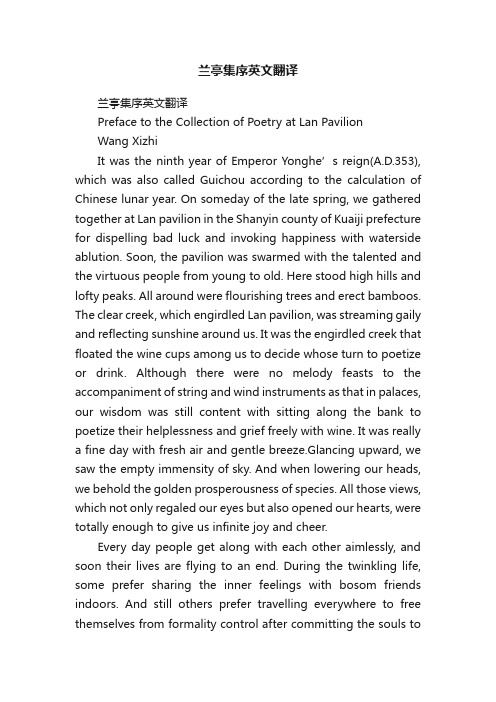
兰亭集序英文翻译兰亭集序英文翻译Preface to the Collection of Poetry at Lan PavilionWang XizhiIt was the ninth year of Emperor Yonghe’s reign(A.D.353), which was also called Guichou according to the calculation of Chinese lunar year. On someday of the late spring, we gathered together at Lan pavilion in the Shanyin county of Kuaiji prefecture for dispelling bad luck and invoking happiness with waterside ablution. Soon, the pavilion was swarmed with the talented and the virtuous people from young to old. Here stood high hills and lofty peaks. All around were flourishing trees and erect bamboos. The clear creek, which engirdled Lan pavilion, was streaming gaily and reflecting sunshine around us. It was the engirdled creek that floated the wine cups among us to decide whose turn to poetize or drink. Although there were no melody feasts to the accompaniment of string and wind instruments as that in palaces, our wisdom was still content with sitting along the bank to poetize their helplessness and grief freely with wine. It was really a fine day with fresh air and gentle breeze.Glancing upward, we saw the empty immensity of sky. And when lowering our heads, we behold the golden prosperousness of species. All those views, which not only regaled our eyes but also opened our hearts, were totally enough to give us infinite joy and cheer.Every day people get along with each other aimlessly, and soon their lives are flying to an end. During the twinkling life, some prefer sharing the inner feelings with bosom friends indoors. And still others prefer travelling everywhere to free themselves from formality control after committing the souls tooutward objects. Though people would rather make different choices by their owns and meet different characters like peaceful or blundering, all of them will become delighted and satisfied the moment that they get what they want, only to forget that old age is just around the corner. However, when they become tired about what they have got, the movement of their sentiment will accompany the change of the outside world, and all kinds of feelings begin to well up in their hearts. There is no doubt that people will experience a pessimistic feeling after knowing the happiness has fleeted from the hands on the instant, let alone knowing the time people live is resigned to the fate and the death is inevitable for everybody in the end. The ancient once said, “Death is as important as life.” Isn't that each mortal’s sorrow?Every time I consider why ancestors wrote poems with some kind of mixed emotions, there always dwells in me a vague understanding like the bond existing between our ideas. And lamenting the ancestors’ writings becomes unavoidable though I can not tell the inner cause always. I know it is ridiculous and insincere to equate death with life. And I also know it is affected and absurd to give equal importance to the long-lived and short-lived. Descendants view us just as we do to ancestors, and how sad it is! Hence I have to write down the names of all present at Lan pavilion and copy out their poetry. Even if times has been changing and circumstances have been going by, I still believe human emotions are similar and future readers can also explore their insights like us while appreciating this collection of poetry.。
《兰亭集序》原文附翻译

《兰亭集序》原文附翻译《兰亭集序》原文附翻译漫长的学习生涯中,说起文言文,大家肯定都不陌生吧?现在我们一般将古文称为文言文。
文言文的类型有哪些,你见过的文言文是什么样的呢?以下是小编收集整理的《兰亭集序》文言文附翻译,仅供参考,大家一起来看看吧。
兰亭集序 / 兰亭序朝代:魏晋作者:王羲之原文:永和九年,岁在癸丑,暮春之初,会于会稽山阴之兰亭,修禊事也。
群贤毕至,少长咸集。
此地有崇山峻岭,茂林修竹;又有清流激湍,映带左右,引以为流觞曲水,列坐其次。
虽无丝竹管弦之盛,一觞一咏,亦足以畅叙幽情。
是日也,天朗气清,惠风和畅,仰观宇宙之大,俯察品类之盛,所以游目骋怀,足以极视听之娱,信可乐也。
夫人之相与,俯仰一世,或取诸怀抱,悟言一室之内;或因寄所托,放浪形骸之外。
虽趣舍万殊,静躁不同,当其欣于所遇,暂得于己,快然自足,不知老之将至。
及其所之既倦,情随事迁,感慨系之矣。
向之所欣,俯仰之间,已为陈迹,犹不能不以之兴怀。
况修短随化,终期于尽。
古人云:“死生亦大矣。
”岂不痛哉!(不知老之将至一作:曾不知老之将至)每览昔人兴感之由,若合一契,未尝不临文嗟悼,不能喻之于怀。
固知一死生为虚诞,齐彭殇为妄作。
后之视今,亦犹今之视昔。
悲夫!故列叙时人,录其所述,虽世殊事异,所以兴怀,其致一也。
后之览者,亦将有感于斯文。
译文永和九年,是癸丑之年,阴历三月初,(我们)会集在会稽山阴的兰亭,是为了从事修禊祭礼。
众多贤才都汇聚在这里,年长的年少的都聚集在一起。
兰亭这地方有高峻的山峰,高大茂密的竹林。
又有清澈湍急的溪流,(如同青罗带一般)环绕在亭子的四周,(我们)引(清流激湍)来作为流觞的曲水,列坐在曲水旁边。
虽然没有演奏音乐的盛况,(但)喝点酒,作点诗,也足以令人抒发内心深处的情意。
这一天,晴明爽朗,春风和暖畅快。
向上看,天空广大无边,向下看,地上事物如此繁多,借以纵展眼力,开畅胸怀,尽情的享受视听的乐趣,实在是快乐呀!人们彼此交往,很快便度过一生。
《兰亭集序》原文阅读及对照翻译
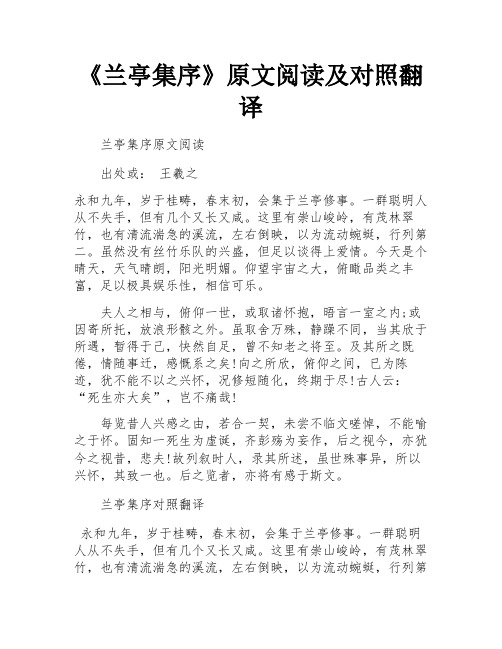
《兰亭集序》原文阅读及对照翻译兰亭集序原文阅读出处或:王羲之永和九年,岁于桂畴,春末初,会集于兰亭修事。
一群聪明人从不失手,但有几个又长又咸。
这里有崇山峻岭,有茂林翠竹,也有清流湍急的溪流,左右倒映,以为流动蜿蜒,行列第二。
虽然没有丝竹乐队的兴盛,但足以谈得上爱情。
今天是个晴天,天气晴朗,阳光明媚。
仰望宇宙之大,俯瞰品类之丰富,足以极具娱乐性,相信可乐。
夫人之相与,俯仰一世,或取诸怀抱,晤言一室之内;或因寄所托,放浪形骸之外。
虽取舍万殊,静躁不同,当其欣于所遇,暂得于己,快然自足,曾不知老之将至。
及其所之既倦,情随事迁,感慨系之矣!向之所欣,俯仰之间,已为陈迹,犹不能不以之兴怀,况修短随化,终期于尽!古人云:“死生亦大矣”,岂不痛哉!每览昔人兴感之由,若合一契,未尝不临文嗟悼,不能喻之于怀。
固知一死生为虚诞,齐彭殇为妄作,后之视今,亦犹今之视昔,悲夫!故列叙时人,录其所述,虽世殊事异,所以兴怀,其致一也。
后之览者,亦将有感于斯文。
兰亭集序对照翻译永和九年,岁于桂畴,春末初,会集于兰亭修事。
一群聪明人从不失手,但有几个又长又咸。
这里有崇山峻岭,有茂林翠竹,也有清流湍急的溪流,左右倒映,以为流动蜿蜒,行列第二。
虽然没有丝竹乐队的兴盛,但足以谈得上爱情。
今天是个晴天,天气晴朗,阳光明媚。
仰望宇宙之大,俯瞰品类之丰富,足以极具娱乐性,相信可乐。
永和九年,丑。
春末三月初的第四天,我们相约在会稽山阴县兰亭,相约喝酒。
这里所有德高望重的人都参加了会议,所有的年轻人和老年人都聚集在一起。
兰亭这个地方四面环山,树木葱郁,竹筏茂密。
还有清澈湍急的小溪,像一条绿色的丝带,左右衬托。
这条小溪是一条蜿蜒的小溪,坐落在它的侧面。
就算没有管弦乐合奏的盛况,光是喝酒写诗就足以让人畅所欲言。
这一天,英格玛阳光明媚,凉风习习,可以仰望浩瀚的宇宙,俯下身去,考察多种事物,饱览全局,敞开胸怀,尽自己所能去见所闻,真的可以说是人生一大乐事。
兰亭序
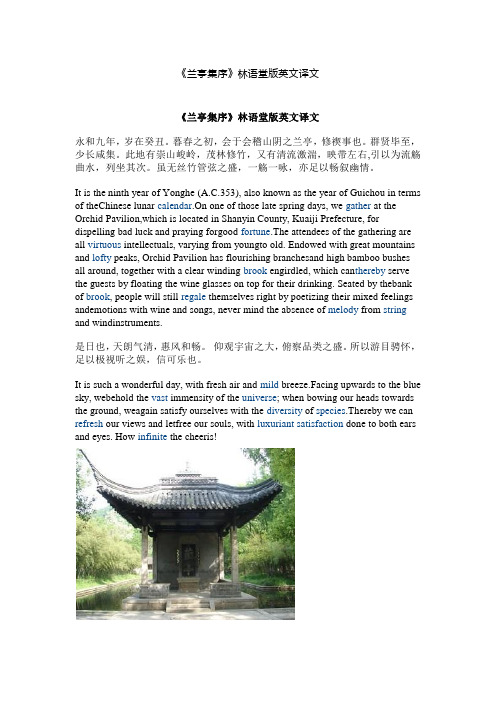
《兰亭集序》林语堂版英文译文《兰亭集序》林语堂版英文译文永和九年,岁在癸丑。
暮春之初,会于会稽山阴之兰亭,修禊事也。
群贤毕至,少长咸集。
此地有崇山峻岭,茂林修竹,又有清流激湍,映带左右,引以为流觞曲水,列坐其次。
虽无丝竹管弦之盛,一觞一咏,亦足以畅叙幽情。
It is the ninth year of Yonghe (A.C.353), also known as the year of Guichou in terms of theChinese lunar calendar.On one of those late spring days, we gather at the Orchid Pavilion,which is located in Shanyin County, Kuaiji Prefecture, for dispelling bad luck and praying forgood fortune.The attendees of the gathering are all virtuous intellectuals, varying from youngto old. Endowed with great mountains and lofty peaks, Orchid Pavilion has flourishing branchesand high bamboo bushes all around, together with a clear winding brook engirdled, which can thereby serve the guests by floating the wine glasses on top for their drinking. Seated by thebank of brook, people will still regale themselves right by poetizing their mixed feelings andemotions with wine and songs, never mind the absence of melody from string and windinstruments.是日也,天朗气清,惠风和畅。
中英对照 兰亭集序
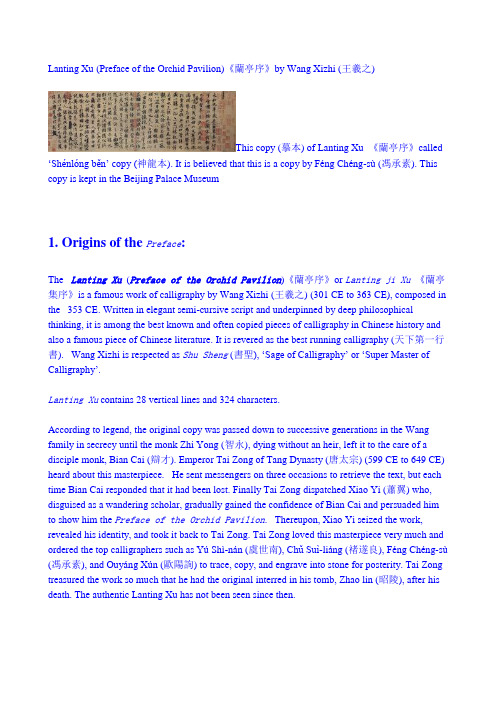
Lanting Xu (Preface of the Orchid Pavilion)《蘭亭序》by Wang Xizhi (王羲之)This copy (摹本) of Lanting Xu 《蘭亭序》called ‘Shénlóng běn’ copy (神龍本). It is believed that this is a copy by Féng Chéng-sù (馮承素). This copy is kept in the Beijing Palace Museum1. Origins of the Preface:The Lanting Xu(Preface of the Orchid Pavilion)《蘭亭序》or Lanting ji Xu《蘭亭集序》is a famous work of calligraphy by Wang Xizhi (王羲之) (301 CE to 363 CE), composed in the 353 CE. Written in elegant semi-cursive script and underpinned by deep philosophical thinking, it is among the best known and often copied pieces of calligraphy in Chinese history and also a famous piece of Chinese literature. It is revered as the best running calligraphy (天下第一行書). Wang Xizhi is respected as Shu Sheng (書聖), ‘Sage of Calligraphy’ or ‘Super Master ofC alligraphy’.Lanting Xu contains 28 vertical lines and 324 characters.According to legend, the original copy was passed down to successive generations in the Wang family in secrecy until the monk Zhi Yong (智永), dying without an heir, left it to the care of a disciple monk, Bian Cai (辯才). Emperor Tai Zong of Tang Dynasty (唐太宗) (599 CE to 649 CE) heard about this masterpiece. He sent messengers on three occasions to retrieve the text, but each time Bian Cai responded that it had been lost. Finally Tai Zong dispatched Xiao Yi (蕭翼) who, disguised as a wandering scholar, gradually gained the confidence of Bian Cai and persuaded him to show him the Preface of the Orchid Pavilion. Thereupon, Xiao Yi seized the work, revealed his identity, and took it back to Tai Zong. Tai Zong loved this masterpiece very much and ordered the top calligraphers such as Yú Shì-nán (虞世南), Chǔ Suì-liáng (褚遂良), Féng Chéng-sù(馮承素), and Ouyáng Xún (歐陽詢) to trace, copy, and engrave into stone for posterity. Tai Zong treasured the work so much that he had the original interred in his tomb, Zhao lin (昭陵), after his death. The authentic Lanting Xu has not been seen since then.2. The occasion – Xiu xi (修禊):Xiū xì (修禊) was a purification ritual to ward off the evil spirit and bring good fortune. It took place on the third day of the Third Lunar Month. Wang Xizhi (王羲之) composed and wrote this masterpiece on this day of purification ritual in 353 CE (1662 years ago).This ritual is no longer celebrated widely in China today but the event is still commemorated in Shaoxing (紹興), the original place. Scholars still practise it in Lanting every year. Japanese scholars and elites also commemorate the event on that day, in particular in 60th year anniversaries when the lunar year coincides with the year 癸丑1913, 1973, 2033. In 1973 there was a great exhibition in Japan of everything related to Lanting, and a good catalogue was published.In 2015, this day falls on 21 April (Tuesday).3. Translation:永和九年,歲在癸丑,暮春之初,會於會稽山陰之蘭亭,脩稧事也。
《兰亭集序》(林语堂两种英文翻译版本)
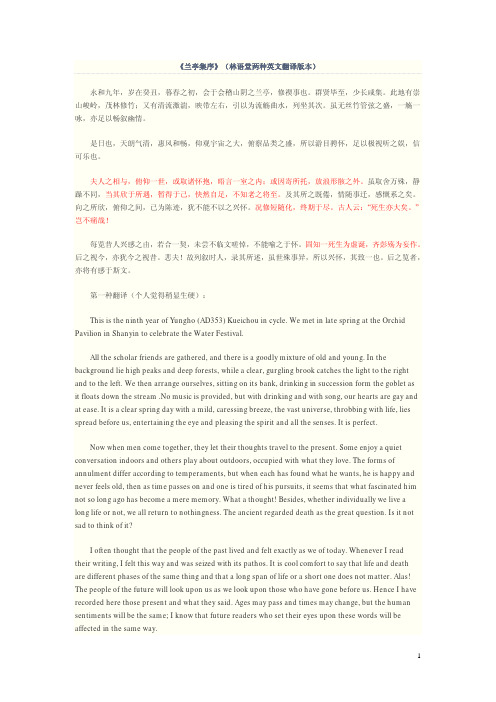
《兰亭集序》(林语堂两种英文翻译版本)永和九年,岁在癸丑,暮春之初,会于会稽山阴之兰亭,修禊事也。
群贤毕至,少长咸集。
此地有崇山峻岭,茂林修竹;又有清流激湍,映带左右,引以为流觞曲水,列坐其次。
虽无丝竹管弦之盛,一觞一咏,亦足以畅叙幽情。
是日也,天朗气清,惠风和畅,仰观宇宙之大,俯察品类之盛,所以游目骋怀,足以极视听之娱,信可乐也。
夫人之相与,俯仰一世,或取诸怀抱,晤言一室之内;或因寄所托,放浪形骸之外。
虽取舍万殊,静躁不同,当其欣于所遇,暂得于己,快然自足,不知老之将至。
及其所之既倦,情随事迁,感慨系之矣。
向之所欣,俯仰之间,已为陈迹,犹不能不以之兴怀。
况修短随化,终期于尽。
古人云:“死生亦大矣。
”岂不痛哉!每览昔人兴感之由,若合一契,未尝不临文嗟悼,不能喻之于怀。
固知一死生为虚诞,齐彭殇为妄作。
后之视今,亦犹今之视昔。
悲夫!故列叙时人,录其所述,虽世殊事异,所以兴怀,其致一也。
后之览者,亦将有感于斯文。
第一种翻译(个人觉得稍显生硬):This is the ninth year of Yungho (AD353) Kueichou in cycle. We met in late spring at the Orchid Pavilion in Shanyin to celebrate the Water Festival.All the scholar friends are gathered, and there is a goodly mixture of old and young. In the background lie high peaks and deep forests, while a clear, gurgling brook catches the light to the right and to the left. We then arrange ourselves, sitting on its bank, drinking in succession form the goblet as it floats down the stream .No music is provided, but with drinking and with song, our hearts are gay and at ease. It is a clear spring day with a mild, caressing breeze, the vast universe, throbbing with life, lies spread before us, entertaining the eye and pleasing the spirit and all the senses. It is perfect.Now when men come together, they let their thoughts travel to the present. Some enjoy a quiet conversation indoors and others play about outdoors, occupied with what they love. The forms of annulment differ according to temperaments, but when each has found what he wants, he is happy and never feels old, then as time passes on and one is tired of his pursuits, it seems that what fascinated him not so long ago has become a mere memory. What a thought! Besides, whether individually we live a long life or not, we all return to nothingness. The ancient regarded death as the great question. Is it not sad to think of it?I often thought that the people of the past lived and felt exactly as we of today. Whenever I read their writing, I felt this way and was seized with its pathos. It is cool comfort to say that life and death are different phases of the same thing and that a long span of life or a short one does not matter. Alas! The people of the future will look upon us as we look upon those who have gone before us. Hence I have recorded here those present and what they said. Ages may pass and times may change, but the human sentiments will be the same; I know that future readers who set their eyes upon these words will be affected in the same way.下面是第二种翻译(这个版本可能更好):The Orchid PavilionIn the ninth year of the reign Yungho[A.D. 353] in the beginning of late spring we met at the Orchid Pavilion in Shanyin of Kweich'i for the Water Festival, to wash away the evil spirits.Here are gathered all the illustrious persons and assembled both the old and the young. Here aretall mountains and majestic peaks, trees with thick foliage and tall bamboos. Here are also clear streams and gurgling rapids, catching one's eye from the right and left. We group ourselves in order, sitting by the waterside, and drinking in succession from a cup floating down the curving stream; and although there is no music from string and wood-wind instruments, yet with alternate singing and drinking, we are well disposed to thoroughly enjoy a quiet intimate conversation.Today the sky is clear, the air is fresh and the kind breeze is mild. Truly enjoyable it is sit to watch the immense universe above and the myriad things below, traveling over the entire landscape with our eyes and allowing our sentiments to roam about at will, thus exhausting the pleasures of the eye and the ear.Now when people gather together to surmise life itself, some sit and talk and unburden their thoughts in the intimacy of a room, and some, overcome by a sentiment, soar forth into a world beyond bodily realities. Although we select our pleasures according to our inclinations—some noisy and rowdy, and others quiet and sedate—yet when we have found that which pleases us, we are all happy and contented, to the extent of forgetting that we are growing old. And then, when satiety follows satisfaction, and with the change of circumstances, change also our whims and desires, there then arises a feeling of poignant regret. In the twinkling of an eye, the objects of our former pleasures have become things of the past, still compelling in us moods of regretful memory. Furthermore, although our lives may be long or short, eventually we all end in nothingness. "Great indeed are life and death", said the ancients. Ah! What sadness!I often study the joys and regrets of the ancient people, and as I lean over their writings and see that they were moved exactly as ourselves, I am often overcome by a feeling of sadness and compassion, and would like to make those things clear to me. Well I know it is a lie to say that life and death are the same thing, and that longevity and early death make no difference! Alas! As we of the present look upon those of the past, so will posterity look upon our present selves. Therefore, have I put down a sketch of these contemporaries and their sayings at this feast, and although time and circumstances may change, the way they will evoke our moods of happiness and regret will remain the same. What will future readers feel when they cast their eyes upon this writing.。
兰亭集序对照翻译
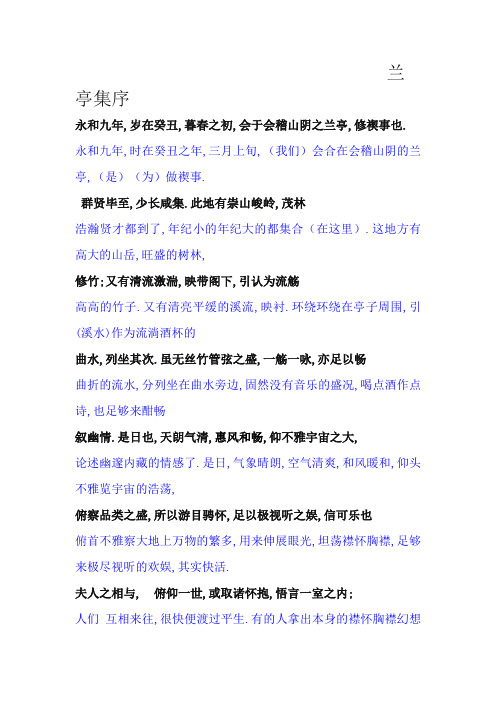
兰亭集序永和九年,岁在癸丑,暮春之初,会于会稽山阴之兰亭,修禊事也.永和九年,时在癸丑之年,三月上旬,(我们)会合在会稽山阴的兰亭,(是)(为)做禊事.群贤毕至,少长咸集.此地有崇山峻岭,茂林浩瀚贤才都到了,年纪小的年纪大的都集合(在这里).这地方有高大的山岳,旺盛的树林,修竹;又有清流激湍,映带阁下,引认为流觞高高的竹子.又有清亮平缓的溪流,映衬.环绕环绕在亭子周围,引(溪水)作为流淌酒杯的曲水,列坐其次.虽无丝竹管弦之盛,一觞一咏,亦足以畅曲折的流水,分列坐在曲水旁边,固然没有音乐的盛况,喝点酒作点诗,也足够来酣畅叙幽情.是日也,天朗气清,惠风和畅,仰不雅宇宙之大,论述幽邃内藏的情感了.是日,气象晴朗,空气清爽,和风暖和,仰头不雅览宇宙的浩荡,俯察品类之盛,所以游目骋怀,足以极视听之娱,信可乐也俯首不雅察大地上万物的繁多,用来伸展眼光,坦荡襟怀胸襟,足够来极尽视听的欢娱,其实快活.夫人之相与, 俯仰一世,或取诸怀抱,悟言一室之内;人们互相来往,很快便渡过平生.有的人拿出本身的襟怀胸襟幻想从心里,坦诚攀谈在室内〈(有的人在室内总论本身的襟怀胸襟幻想);〉或因寄所托,放浪形骸之外.有的人就着依靠所快活爱好的事物.放肆.无拘谨身材的外面.(有的人就着本身所快活爱好的事物,依靠本身的情怀,不受束缚,放肆无羁的生涯.虽趣舍万殊,静躁不合,当其欣于固然取向舍弃千差万别(固然各有各的快活爱好),安静与躁动各不雷同,当他们愉快对于所遇,暂得于己,所碰到的事物(他们对所接触的事物觉得愉快时),临时自得对于本身(一时觉得自得),快然自足,不知老之将至.及其(于)所之既倦,觉得愉快和知足,(竟然)不知道衰宿将要到来.等到他们对所得到或爱好的器械已经喜爱,(之,往.到达)情随事迁,感叹系之矣.向之所欣,俯仰之间,情感跟着事物的变更而变更,感叹随之产生.(系,附着)曩昔所爱好的器械,转刹时,已为陈迹,犹不克不及不以之兴怀.况修短随化,已经成为旧迹,尚且不克不及不因为它激发心中的感想,何况寿命长短,任凭造化,终期于尽.前人云:“逝世生亦大矣.最终到止境〈(最后归结于祛除).(期:至.及)〉前人说:“逝世生也是件大事啊.””岂不痛哉!每览古人兴感之由,若合一契,未尝不临文怎么能不哀思呢?每当看到前人产生感叹的原因,像一张符契那样相和,未尝不面临文章嗟悼,不克不及喻之于怀.固知一逝世生为虚诞,太息快乐,不克不及明确这道理在心里.本来知道把逝世活等同的说法是不真实的,齐彭殇为妄作.后之视今,亦犹今之视昔.悲夫!把长寿和夭折等同起来的说法是乱说的.后人对待今人,也像今人对待前人,可悲呀.故列叙时人,录其所述,虽世殊事异,所以一个一个记下当时与会的人,录下他们所作的诗篇.纵使时期变了工作不合了,所以兴怀,其致一也.……的原因产生情怀,〈(但)人们产生情怀的原因〉他们的思惟情趣是一样的.后之览者,亦将有感于斯文.后世的读者,也将对此次聚会会议的诗文有所感叹.。
兰亭集序翻译
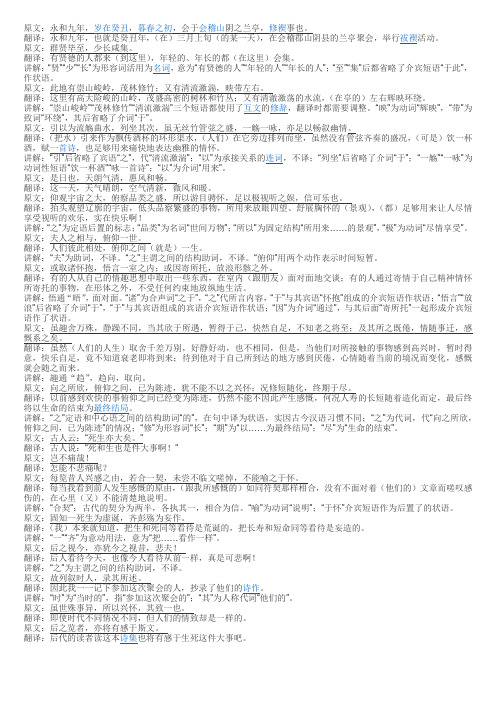
原文:永和九年,岁在癸丑,暮春之初,会于会稽山阴之兰亭,修禊事也。
翻译:永和九年,也就是癸丑年,(在)三月上旬(的某一天),在会稽郡山阴县的兰亭聚会,举行祓禊活动。
原文:群贤毕至,少长咸集。
翻译:有贤德的人都来(到这里),年轻的、年长的都(在这里)会集。
讲解:“贤”“少”“长”为形容词活用为名词,意为“有贤德的人”“年轻的人”“年长的人”;“至”“集”后都省略了介宾短语“于此”,作状语。
原文:此地有崇山峻岭,茂林修竹;又有清流激湍,映带左右。
翻译:这里有高大险峻的山岭,茂盛高密的树林和竹丛;又有清澈激荡的水流,(在亭的)左右辉映环绕。
讲解:“崇山峻岭”“茂林修竹”“清流激湍”三个短语都使用了互文的修辞,翻译时都需要调整。
“映”为动词“辉映”,“带”为致词“环绕”,其后省略了介词“于”。
原文:引以为流觞曲水,列坐其次,虽无丝竹管弦之盛,一觞一咏,亦足以畅叙幽情。
翻译:(把水)引来作为飘传酒杯的环形渠水,(人们)在它旁边排列而坐,虽然没有管弦齐奏的盛况,(可是)饮一杯酒,赋一首诗,也足够用来痛快地表达幽雅的情怀。
讲解:“引”后省略了宾语“之”,代“清流激湍”;“以”为承接关系的连词,不译;“列坐”后省略了介词“于”;“一觞”“一咏”为动词性短语“饮一杯酒”“咏一首诗”;“以”为介词“用来”。
原文:是日也,天朗气清,惠风和畅。
翻译:这一天,天气晴朗,空气清新,微风和暖。
原文:仰观宇宙之大,俯察品类之盛,所以游目骋怀,足以极视听之娱,信可乐也。
翻译:抬头观望辽廓的宇宙,低头品察繁盛的事物,所用来放眼四望、舒展胸怀的(景观),(都)足够用来让人尽情享受视听的欢乐,实在快乐啊!讲解:“之”为定语后置的标志;“品类”为名词“世间万物”;“所以”为固定结构“所用来……的景观”,“极”为动词“尽情享受”。
原文:夫人之相与,俯仰一世。
翻译:人们彼此相处,俯仰之间(就是)一生。
讲解:“夫”为助词,不译。
“之”主谓之间的结构助词,不译。
- 1、下载文档前请自行甄别文档内容的完整性,平台不提供额外的编辑、内容补充、找答案等附加服务。
- 2、"仅部分预览"的文档,不可在线预览部分如存在完整性等问题,可反馈申请退款(可完整预览的文档不适用该条件!)。
- 3、如文档侵犯您的权益,请联系客服反馈,我们会尽快为您处理(人工客服工作时间:9:00-18:30)。
It is the ninth year of Yonghe also known as the year of Guichou in terms of the Chinese lunar one of those late spring days, we gather at the Orchid Pavilion, which is located in Shanyin County, Kuaiji Prefecture, for dispelling bad luck and praying for good attendees of the gathering are all virtuous intellectuals, varying from young to old. Endowed with great mountains and lofty peaks, Orchid Pavilion has flourishing branches and high bamboo bushes all around, together with a clear winding brook engirdled, which can thereby serve the guests by floating the wine glasses on top for their drinking. Seated by the bank of brook, people will still regale themselves right by poetizing their mixed feelings and emotions with wine and songs, never mind the absence of melody from string and wind instruments.
永和九年,岁在癸(guǐ)丑。
暮春之初,会于会(kuài)稽山阴之兰亭,修禊(xì)事也。
群贤毕至,少长(zhǎng)咸集。
此地有崇山峻岭,茂林修竹,又有清流激湍,映带左右,引以为流觞(shāng)曲水,列坐其次。
虽无丝竹管弦之盛,一觞一咏,亦足以畅叙幽情。
It is such a wonderful day, with fresh air and mild upwards to the blue sky, we behold the vast immensity of the universe; when bowing our heads towards the ground, we again satisfy ourselves with the diversity of we can refresh our views and let free our souls, with luxuriant satisfaction done to both ears and eyes. How infinite the cheer is!
是日也,天朗气清,惠风和畅。
仰观宇宙之大,俯察品类之盛。
所以游目骋(chěng)怀,足以极视听之娱,信可乐也。
People keep coming and going, and life soon rushes to its end. Some people prefer to share their proud aspiration and lofty goals with close friends indoors, while some others choose to follow their interest and free their minds wherever and whenever they like. May characters vary from person to person, or some would rather stay peaceful while others like to live restlessly, they will all become delighted and satisfied once they meet something pleasant, so cheerful that they get unaware
of their imminent old , when they get tired of their old fancies that they’ve already experienced, and sentiment correspondingly accompanies the change of situation, all sorts of complicated feelings will well up in the heart, too. Isn’t it
thought-provoking that the happiness we used to enjoy passes by without leaving a single trace, let alone that the length of life is subject to the fate, and death is inevitable for anybody in the end Just as some ancient man once put it, “Death also deserves our attention, like what life does.”, so how can we restrain ourselves from grieving
夫(fú)人之相与,俯仰一世。
或取诸怀抱,悟言一室之内;或因寄所托,放浪形骸之外。
虽趣(qǔ)舍万殊,静躁不同,当其欣于所遇,暂得于己,快然自足,不知老之将至;及其所之既倦,情随事迁,感慨系之矣。
向之所欣,俯仰之间,已为陈迹,犹不能不以之兴怀,况修短随化,终期于尽!古人云:“死生亦大矣”,岂不痛哉!
Every time I ponder about the reasons why our predecessors would produce works with such inenarrable emotions, I find there seem some similarities between our minds. Yet I cannot help lamenting their literary masterpieces while I am struggling for the very cause in my innermost world. Now I come to realize that it has been ridiculous for me to equate death with life, long life with short life . The descendents view us just the way we look at our predecessors, and how woeful it is! Hence I write down all the names of the attendees and put their poetry into record. Conditions may go with the changes of time, but people’s emotions shall stay the same. I believe the following readers will still have much to mediate about life and death when appreciating this poetry anthology.
·
每览昔人兴感之由,若合一契,未尝不临文嗟悼(jiē dào),不能喻之于怀。
固知一死生为虚诞,齐彭殇(shāng)为妄作。
后之视今,亦犹今之视昔,悲夫!故列叙时人,录其所述,虽世殊事异,所以兴怀,其致一也。
后之览者,亦将有感于斯文。
